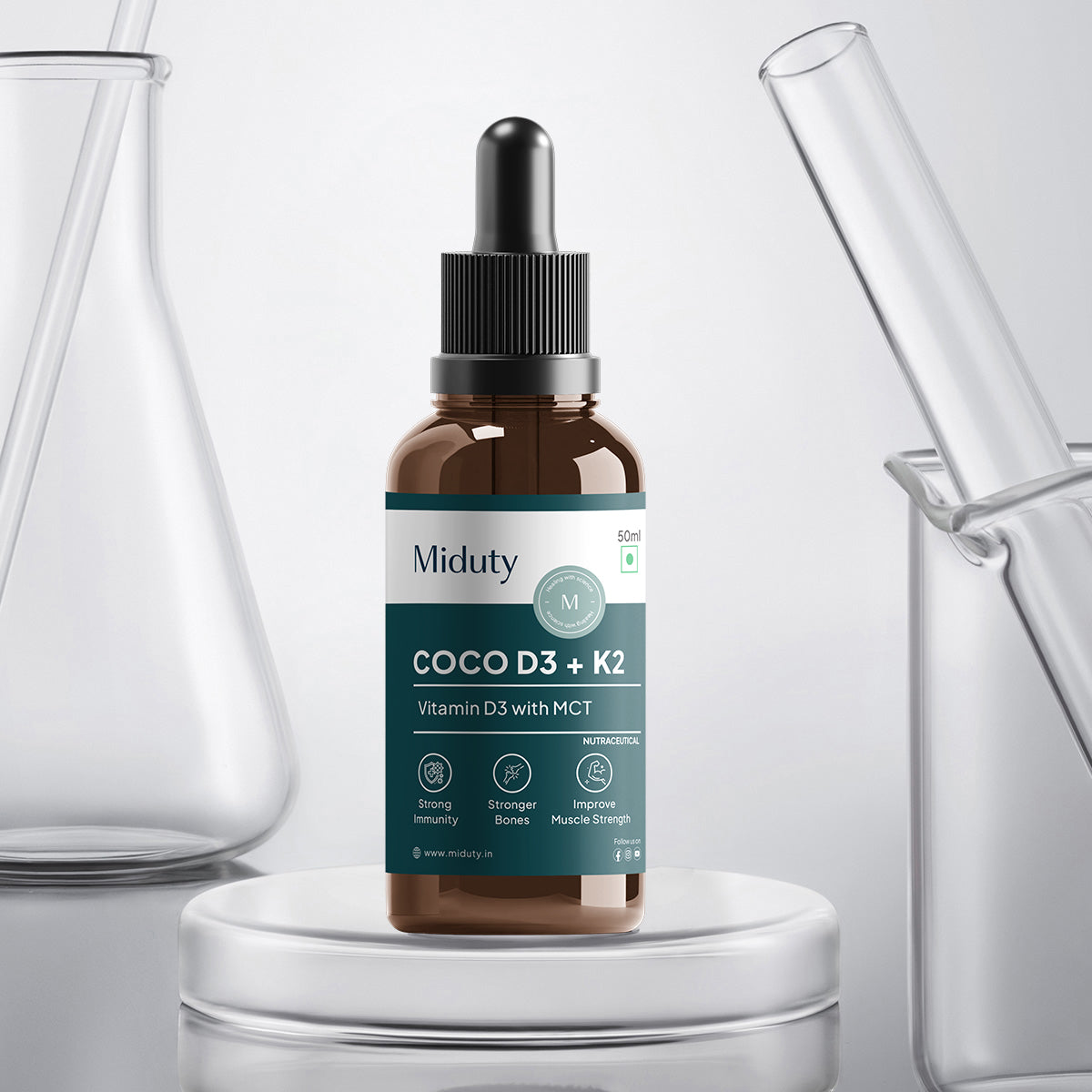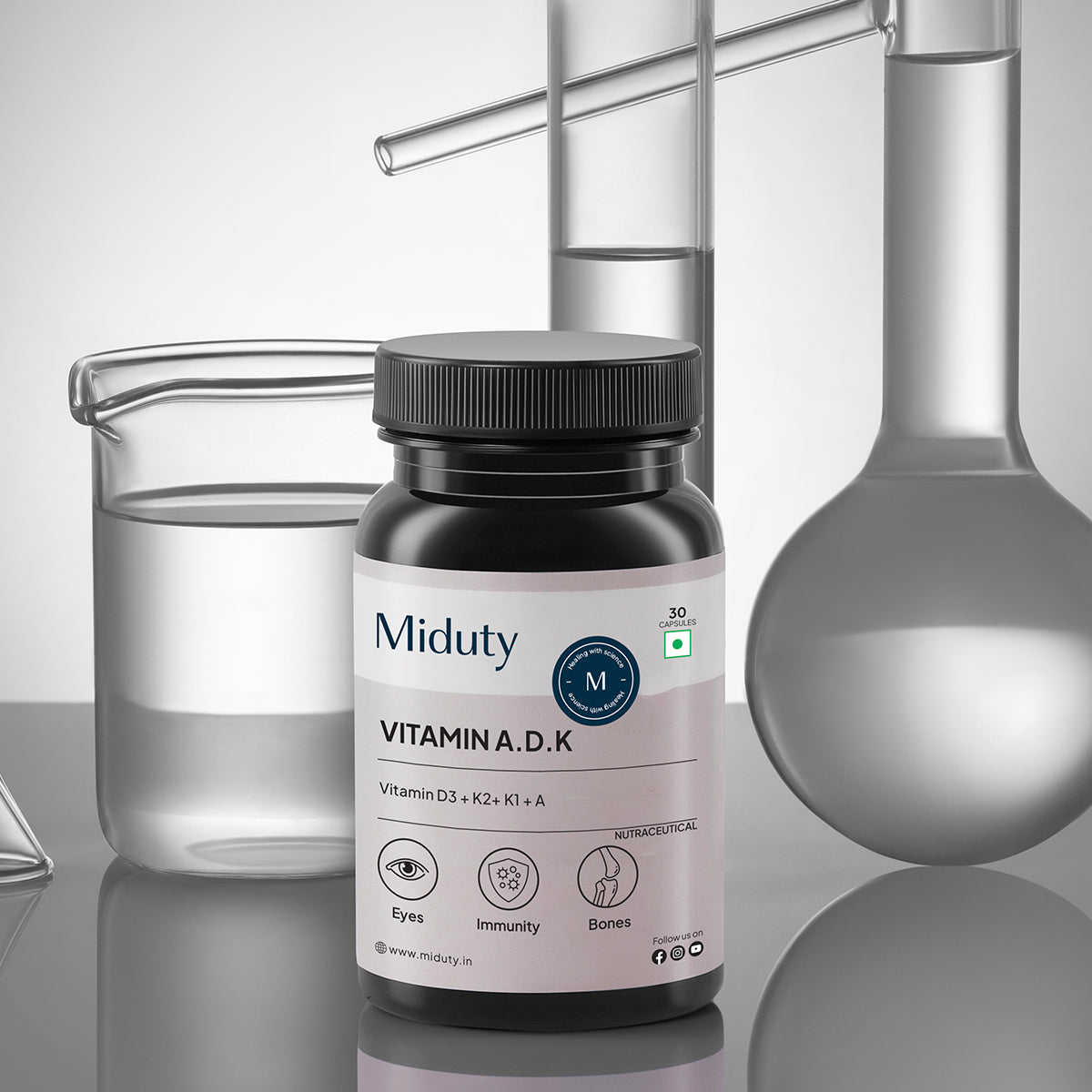
Vitamin D3 and K2 for Weight Loss: Benefits and Lifestyle Tips Explained
When people think about losing weight, they often focus on calorie counting, exercise, or cutting carbs. But nutrition is far more complex. Micronutrients — especially vitamins — quietly influence how our bodies burn energy, store fat, and regulate appetite. Among these, Vitamin D3 and Vitamin K2 stand out. Together, they not only strengthen bones and protect the heart but also support metabolic processes that can make weight management more effective.
In this article, we'll break down what Vitamin D3 and K2 are, explore their individual roles, uncover how they work together, and explain how this powerful duo can help with sustainable weight loss.
Key Takeaways
1. D3 Fuels, K2 Directs – Vitamin D3 helps your body absorb calcium and burn fat, while K2 ensures nutrients go where they belong for healthier metabolism.
2. Better Together – The D3 + K2 duo improves insulin control, reduces inflammation, and protects your heart, making weight loss safer and more effective.
Fat-Burning Allies – These vitamins support mitochondrial function, hormone balance, and energy production turning your body into a more efficient fat-burner.
Strength Without Sacrifice – D3 and K2 protect muscle and bone density during weight loss, so you shed fat without losing strength.
Beyond the Scale – This powerhouse combo not only supports sustainable weight management but also boosts long-term bone, muscle, and cardiovascular health.
What Is Vitamin D3?
Vitamin D3, also called cholecalciferol, is a fat-soluble vitamin produced when sunlight hits the skin. It is also found in foods such as fatty fish, egg yolks, and fortified dairy products. Unlike other vitamins that act as co-factors, Vitamin D3 functions more like a hormone, influencing over 200 genes in the body.
Most people know Vitamin D3 for its role in bone health, but it also plays a crucial role in weight regulation by influencing how the body stores fat, manages insulin, and controls appetite.
Benefits of Vitamin D3 for Weight Loss
1. Supports Fat Metabolism
Vitamin D3 helps regulate genes involved in fat breakdown and storage. Low levels are linked with higher body fat percentages, as the body tends to store fat more readily when Vitamin D3 is deficient.[1]
2. Improves Insulin Sensitivity
Adequate Vitamin D3 supports the pancreas in releasing insulin and helps cells respond better to it. Improved insulin sensitivity reduces fat storage and makes it easier for the body to burn glucose for energy instead of storing it as fat.
3. Reduces Inflammation
Obesity is often associated with low-grade chronic inflammation. Vitamin D3 helps regulate inflammatory pathways, which not only supports weight management but also improves overall metabolic health. [2]
4. Boosts Energy and Exercise Performance
By improving muscle function and energy production, Vitamin D3 can help people stay active — a cornerstone for effective weight loss. Those with higher Vitamin D levels often report better stamina and lower fatigue during workouts.
What Is Vitamin K2?
Vitamin K2, or menaquinone, is another fat-soluble vitamin found in fermented foods like natto, aged cheese, and certain animal products. Unlike Vitamin K1, which mainly helps with blood clotting, Vitamin K2's primary role is guiding calcium into bones and away from arteries.
But recent studies suggest Vitamin K2 also influences metabolic pathways, particularly those linked with fat storage, glucose regulation, and hormone balance — all of which can affect body weight.
[3]Benefits of Vitamin K2 for Weight Loss
1. Supports Metabolic Health
Vitamin K2 plays a role in activating proteins that regulate energy metabolism. This may improve how efficiently the body burns calories and prevent excess fat accumulation.
2. Regulates Hormones Linked to Fat Storage
By supporting insulin sensitivity and influencing adiponectin (a hormone linked to fat metabolism), K2 may help shift the body from storing fat to burning it more efficiently.
[4]3. Improves Mitochondrial Function
K2 is involved in supporting mitochondrial health — the energy factories of cells. Strong mitochondrial function allows the body to use fat as a steady fuel source, aiding weight management.
4. Prevents Arterial Calcification During Weight Loss
Rapid weight loss can sometimes stress the cardiovascular system. K2 ensures calcium stays in bones, protecting arteries and supporting heart health even during metabolic shifts.
How Vitamin D3 and K2 Work Together?

Both vitamins are essential individually, but their synergy is especially powerful. The main connection lies in calcium metabolism:
- Vitamin D3 increases calcium absorption.
- Vitamin K2 directs calcium where it belongs — bones and teeth — and prevents it from depositing in arteries or soft tissue.
For weight loss, this balance matters. Proper calcium regulation affects fat cell development, energy metabolism, and insulin sensitivity. Without enough K2, the benefits of D3 may be incomplete, leading to calcium imbalances that can affect both health and weight management.
Benefits of Combining Vitamin D3 and K2 for Weight Loss
1. Better Fat Utilization
D3 helps absorb nutrients and supports fat metabolism, while K2 ensures calcium-dependent enzymes work properly, helping the body burn fat instead of storing it.
2. Improved Insulin Control
Together, D3 and K2 improve how the body manages blood sugar and insulin. Stable insulin means fewer cravings, less fat storage, and more consistent energy levels.
3. Stronger Muscles and Bones During Weight Loss
Losing weight can sometimes mean losing muscle or bone density. D3 + K2 protect muscle performance and bone strength, helping the body lose fat without compromising overall structure.
4. Reduced Inflammation for Easier Fat Loss
Both vitamins lower systemic inflammation, which otherwise blocks fat-burning signals and promotes weight gain.
5. Long-Term Heart and Metabolic Health
As weight comes off, the risk of heart disease and metabolic syndrome should also decline. The D3 + K2 duo supports this process by protecting arteries, lowering calcification risk, and improving circulation.
Top Sources of Vitamin D3 and K2
Getting these vitamins through diet alone can be challenging, especially if you live in areas with limited sunlight or eat little fermented food. Here's where you can find them:
1. Sunlight
The best natural source of Vitamin D3 is sunlight. Just 15–20 minutes of sun exposure a few times per week can significantly raise D3 levels, though this varies depending on skin type, season, and location.
2. Dietary Sources of Vitamin D3
- Fatty fish like salmon, mackerel, and sardines
- Egg yolks
- Fortified milk or plant-based alternatives
3. Dietary Sources of Vitamin K2
- Natto (fermented soybeans — the richest source)
- Aged cheeses
- Grass-fed butter and meat
- Fermented foods like sauerkraut (in smaller amounts)
4. Vitamin D and K Supplements
Because it's hard to consistently get both vitamins from diet and sunlight alone, supplements can be a reliable option. Combined D3 + K2 supplements ensure you get the right balance for both bone health and metabolic support.
How to Choose the Best Vitamin D3 + K2 Supplement
1. Look for Bioavailable Forms: Choose Vitamin D3 (cholecalciferol) and Vitamin K2 in the MK-7 form — it lasts longer in the body than MK-4.
2. Check Dosage: Common D3 doses range between 1,000–5,000 IU daily. K2 (MK-7) is usually effective at 90–200 mcg.
3. Opt for Combined Formulas: Supplements that provide both D3 and K2 together help ensure proper synergy and reduce the chance of imbalance.
4. Verify Quality and Purity: Go for products that are third-party tested, non-GMO, and free from unnecessary fillers.
5. Consider Your Lifestyle: If you have limited sun exposure or a diet low in fermented foods, supplementation becomes even more important.
Supporting Lifestyle & Diet Recommendations
While D3 and K2 play important roles in weight management, they aren't a substitute for a healthy lifestyle. Here are some habits that maximize their benefits:
1. Maintain a Balanced Diet: Focus on whole foods rich in protein, healthy fats, and fiber to keep you full and support metabolism.
2. Exercise Regularly: Strength training and cardio boost fat burning and improve insulin sensitivity, working hand-in-hand with D3 + K2.
3. Prioritize Sun Exposure: Even brief outdoor time can raise Vitamin D3 levels naturally.
4. Avoid Excess Calcium Supplements: Too much calcium without balanced D3 and K2 may harm arteries instead of helping bones.
Conclusion
Vitamin D3 and K2 are often overlooked in weight loss conversations, yet they play a powerful role in how the body manages fat, insulin, and energy. D3 acts as the gatekeeper, ensuring calcium and nutrients are absorbed, while K2 directs them to the right places, preventing harmful buildup and supporting efficient metabolism.
For anyone trying to lose weight, this combination doesn't just make the process more effective — it also safeguards long-term bone, muscle, and heart health. When paired with the right diet, exercise, and lifestyle habits, D3 and K2 are more than just vitamins — they're allies in sustainable, healthy weight management.
FAQ's on Vitamin D3 and K2 for Weight Loss -
Q1 - Does K2 burn belly fat?
Yes, Vitamin K2 may play a role in reducing belly fat, according to several studies. In a 3-year trial with postmenopausal women, supplementation with Vitamin K2 (MK-7) led to notable reductions in abdominal fat mass and visceral adipose tissue compared to a placebo. Animal research also supports these findings, studies in mice with fatty liver disease showed that K2 supplementation helped lower overall body fat.
Q2 - Do vitamin D3 and K2 reduce bloating?
A study found that taking a Vitamin D supplement for 4 months reduced several markers of inflammation and improved PMS symptoms such as stomach pain, cramps, constipation, and bloating.
Q3 - How much vitamin K2 to lose weight?
There isn't a one-size-fits-all weight loss dose for Vitamin K2. However, research suggests that 180 mcg per day of MK-7 may help reduce abdominal and visceral fat in postmenopausal women, though results can vary between individuals. For general health, adults may benefit from 100–300 mcg daily. Since needs depend on factors like diet, lifestyle, and medical history, it's best to consult a healthcare professional before starting any supplement.
Q4 - Does vitamin D3 make you lose weight?
Vitamin D3 doesn't directly trigger weight loss, but maintaining adequate levels can support weight management. It does this by improving insulin sensitivity, enhancing muscle function, and helping regulate hormones that influence appetite. Some studies suggest Vitamin D3 may aid fat loss or help prevent weight gain when combined with healthy lifestyle changes, but current evidence is not strong enough to consider it a primary weight loss solution.
Q5 - Can you lose weight by taking vitamin D3 and K2?
Vitamin D3 and K2 can indirectly support weight loss by enhancing metabolism, improving insulin sensitivity, and reducing inflammation — though they aren't direct fat burners. Vitamin D3 helps regulate fat cells, while K2 directs calcium into bones, protecting arteries from buildup. Research links adequate levels of these vitamins to better weight management, but for best results, they should be paired with a balanced diet and regular exercise.
References













